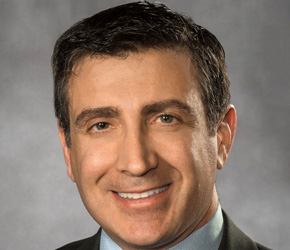Drew Moghanaki, MD, MPH

Dr. Moghanaki is a Professor and Chief of Thoracic Oncology at the UCLA Department of Radiation Oncology. He holds a joint appointment at the Greater Los Angeles Veterans Affairs Medical Center where he directs patient care and research for Veterans with lung cancer. Dr. Moghanaki is a member of the ROI Founders’ Circle.
Why did you decide to become a radiation oncologist?
I have Dr. Prabhakar Tripuraneni to thank for introducing me to the field. I had been basking in the idea of becoming an academic surgical oncologist during an extramural Howard Hughes Medical Institute research fellowship during medical school when he helped me appreciate how much more opportunity there may be in radiation oncology. I wanted to tackle a tough field in medicine that is rapidly changing, while also being directly involved with patients and families who are undergoing very difficult situations.
How do you envision the future of the field of radiation oncology evolving?
I continue to believe in a day when all oncologists engage in a true multi-disciplinary model of care. It’s in these settings where I’ve seen the best decisions made for patients, given the opportunity to better appreciate the value that different treatments have to offer. Such a model of care will become increasingly important as genomic and imaging biomarkers are used more frequently, and the benefits of stereotactic radiotherapy become more widely appreciated for patients with oligoprogressive disease.
You use social media on a regular basis. What would you tell others in radiation oncology about using social media?
I have really enjoyed my time on Twitter. It continues to broaden my intellectual horizons, and allows me to keep up to date with a diverse array of discoveries across a range of areas that I would otherwise not be able to do. It offers an opportunity to escape our conventional way of daily thinking, to learn from colleagues in various specialties from around the world. While almost always educational, it can also provide for some intellectual entertainment at times. Particularly when subject matter experts debate controversial topics in a public forum and recognize the need to tread carefully since “everyone” is watching.
What prompted your decision to make a financial contribution to the Radiation Oncology Institute?
The time had finally come to support ROI after learning that Dr. Jason Efstathiou had joined. He and I have been working closely for a number of years serving ASTRO as chairs of the Genitourinary Scientific Committee. Perhaps it was peer-pressure, but it actually felt only natural to come on board and make a contribution at the same level of the Founders’ Circle.
Were there any other reasons that inspired you to join?
I had actually been inspired by ROI’s mission ever since I learned of the grant that was awarded to Dr. Christopher Slatore in 2013. He is a research pulmonologist at the VA Medical Center in Portland Oregon and was funded to prospectively study patient reported quality of life outcomes after lung cancer surgery or SBRT for stage I NSCLC. This ROI-funded work resulted in not only multiple publications that I was fortunate enough to co-author, but actually contributed to the design of the phase III Veterans Affairs Lung Cancer Surgery or Stereotactic Radiotherapy trial that we activated in 2017.
What would you say to encourage young doctors like yourself to support ROI?
It’s easy for clinicians to compartmentalize the idea of philanthropy as something that is better suited for folks near retirement. But that approach minimizes the period of time one would be engaged to watch their investments grow. So, my advice is to get on board earlier to be a part of the growth.














